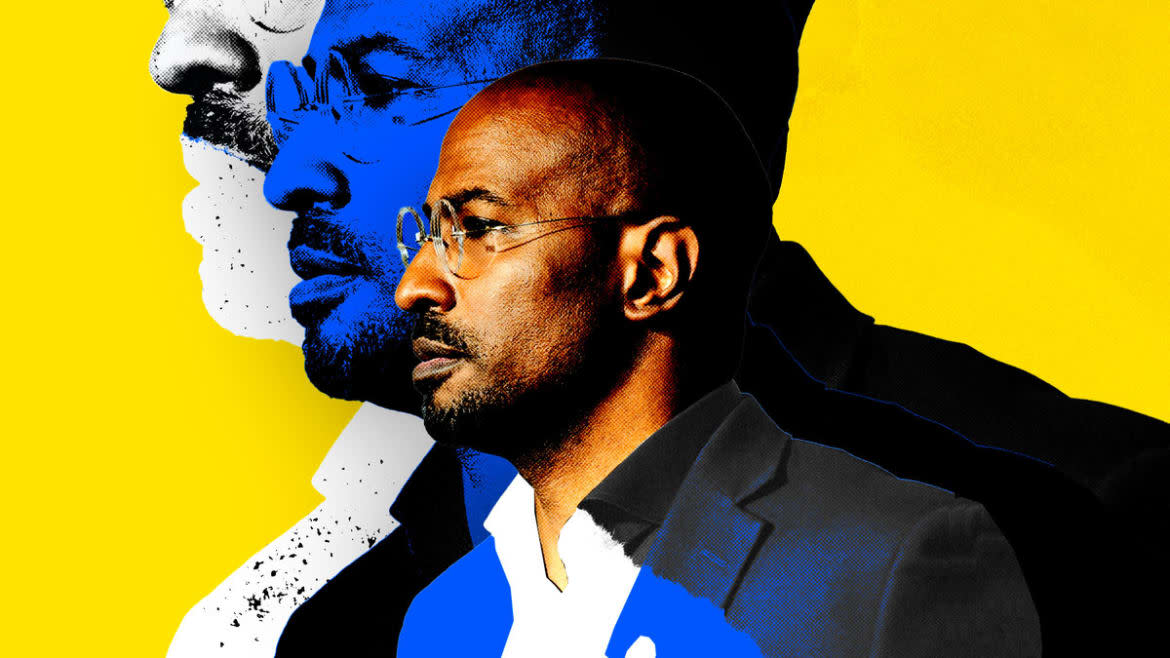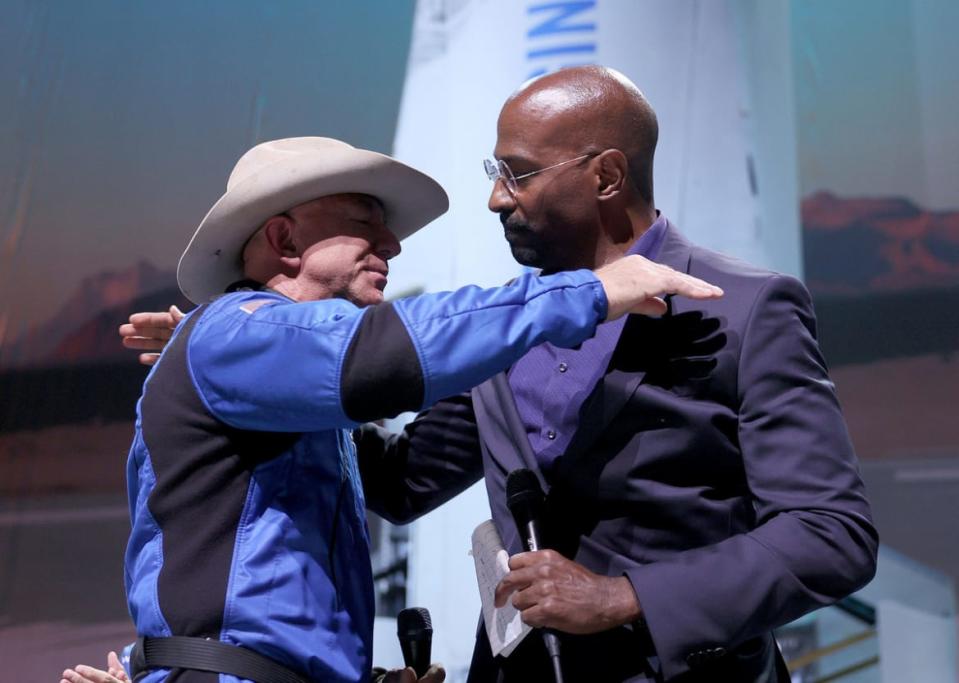Van Jones, Bezos’ $100M Man, Pushed Out of His Own Non-Profit

Two years ago, facing a sea of reporters, Jeff Bezos praised Van Jones as an extraordinary philanthropic leader, handing the CNN commentator a $100 million blank check to distribute as he saw fit. Bezos had just completed his first suborbital rocket flight and, feeling plucky, had dressed as a space cowboy, forcing Jones to duck beneath his expansive hat as the two men embraced.
Jones looked down, his eyes seemingly misty. “Sometimes, dreams come true,” he said.
Since then, the mist has lifted. This summer, Jones left the board of one of his principal nonprofits, Dream.org, after tussling with the group’s leadership over its direction, multiple sources with ties to the organization told The Daily Beast. According to a person with direct knowledge of the situation, he did not leave by choice.

Jeff Bezos hugs Van Jones after announcing a $100 million award for his projects.
The turmoil has not affected just Jones, nine former employees said. One Dream subsidiary, an environmental advocacy initiative called Green For All, separately received a three-year, $10 million grant from Bezos’ climate fund in 2020. The group tore through that money with little to show for it, several ex-employees said. Bezos’ nonprofit has not renewed the grant. Meanwhile, Dream has laid off multiple staffers.
“Quite a few people have questions about the fiscal stewardship that Dream.org has had,” said CeCe Grant, who worked for Dream for more than two years, most recently as director of government affairs until April.
What Is Van Jones Doing With Bezos’ $100 Million?
Asked about Jones’ status with Dream.Org, his spokesperson and a spokesperson for the group did not deny that he had been ousted from the board and instead provided vague statements.
Jones’ spokesperson said: “Van continues to work with Dream.Org in the justice innovation space and beyond. He is a proud supporter of their work at every level. With Dream.Org’s support, he is working to launch a new, complementary initiative, which will be announced soon.”
A spokesperson for Dream said Jones stopped running day-to-day affairs in 2019 but “has continued to be a valuable resource for us, and we’re excited to support the launch of his forthcoming initiative.”
Bezos’ charitable fund did not respond to a request for comment.
Jones, 54, is best known for his appearances on CNN, but he is equally prolific off screen. He co-founded the Ella Baker Center for Human Rights, which partly focuses on police brutality, and served as founding CEO of REFORM, which is working to reshape America’s approach to prison sentencing.
Dream.org is composed of three separate initiatives: Green For All; a program to increase diversity in the tech industry; and a criminal justice policy group. Jones once served as Dream’s president—after he handed off day-to-day affairs in 2019, he remained a board member until his June exit, former employees said. (He is still listed as a board member on the Dream website, but neither his spokesperson nor the group would comment on why that is.)
To Jones’ critics, his body of work is not entirely laudable. “He can’t stay at anything for longer than a few years before passing it off,” one former employee said. Another echoed that sentiment, arguing that Jones has a habit of “moving on to the next thing, and possibly not creating the best infrastructure before he leaves.”

Van Jones accepts an award at Global Green USA’s 12th Annual Green Cross Millennium Awards on June 14, 2008, in Santa Monica, California.
Several Dream staffers defended Jones, however, and blamed the organization’s management team for the tumult and zealous spending. “It’s like your mother can’t be responsible for everything bad you do in your life,” one of his allies contended.
In private, Jones appears to have harbored doubts about Dream’s efficacy, former employees said, since he chose not to funnel much of his $100 million award into the organization.
Born to two educators in Jackson, Tennessee, Jones was a “stereotypical geek,” his twin sister, Angela, told The New Yorker in 2009. His parents named him Anthony, but on the “first day of his freshman year” at the University of Tennessee at Martin, Jones started going by Van, he told the outlet. The moniker, he determined, had “a little touch of nobility, but at the same time [was] not overboard.”
After graduating, Jones earned a degree from Yale Law School, then entered the world of nonprofits and public service. He co-founded the Ella Baker Center in 1996, followed by Color of Change (focused on racial justice) in 2005 and Green For All around the end of 2007.
Green For All later merged with some of Jones’ other initiatives, and over time, the group’s budget expanded. In 2019, Dream received more than $5 million in contributions, according to public filings. The next year, thanks to Bezos’ $10 million award, that figure quadrupled.
Green For All quickly went on a hiring spree, former employees said, and its overhead swelled. In all, Dream’s expenses rose from $6.1 million in 2020 to $10.9 million in 2021; contributions continued to rise that year as well.
Van Jones’ ‘Bullshit’ Antisemitism Apology Lands Like a Lead Balloon
Multiple former staffers said that Green For All’s leaders struggled to form a coherent plan. “No one was sure what we were doing or what our strategy was,” one ex-employee said. At one point, the person added, Green For All decided to focus on helping promote sustainability and environmental justice in 10 cities. “[That] sounds great until you think about how we’ve never worked local before. We didn’t have a presence in these 10 cities.”
Many of the locations already had personnel or local nonprofits tackling similar issues, the former employee said. The person recalled sending emails to local groups asking if they wanted Green For All’s help. “They’d say, ‘What do you have to offer?’ And we’d say, ‘We don’t know yet.’”
According to Samuel Brunson, who researches nonprofits at Loyola University Chicago School of Law, organizations that receive large grants from a single entity run the risk of overspending. If the nonprofit uses their windfall “on something infrastructural, something that would last them, that’s not a terrible thing. But if they do it for hiring… that means they need to keep fundraising to keep paying salaries,” he said. “So it seems like a significant risk if they’re using it to spend on ongoing expenses.”
A spokesperson for Dream insisted that the group “has never been in a stronger place financially,” adding that it had hired staff after receiving Bezos’ $10 million grant and is “proud of the work they’ve been able to accomplish thus far.” The group’s list of successes, he said, include generating 11,318 signatures to petition for more equity and justice in the Inflation Reduction Act, participating in more than 30 events, and launching a program to “help federal agencies meet equity goals.”
Jones, he continued, has also routed money from Bezos’ $100 million award through Dream to create a “justice innovation prize”—which will give grants to “the best ideas to disrupt the prison industry”—and to fund similar efforts at social entrepreneurship.
The alleged issues at Green For All have not just been financial. Another former employee said the group has been unwaveringly committed to achieving bipartisan consensus for its policies—one of Jones’ frequent talking points. (His podcast, Uncommon Ground, centered on this theme.)
The approach may sound pragmatic, but to the employee, it manifested as building relationships with center and right-wing groups who were ideologically opposed to many of the activists’ goals. “I know who [is] on our side… and who’s just not going to be there,” the former employee said.
Broadly, the person continued, Green For All seemed to be “putting a Black person out there—myself—to say things that were more right-wing or center-focused,” including expediting the permitting process for energy projects and proposing significant changes to the National Environmental Policy Act. Overall, the former employee found the experience “very hard and kind of traumatic.”
Jones has a history of controversial attempts at bridge-building. As The Daily Beast reported in 2020, he infuriated progressives by quietly meeting with the Trump administration to craft a poorly received executive order on police reform, then touting it on CNN. (Jones denied that he had helped draft the order.)
No surprise, Jones’ world view has been divisive even within his own ranks. The most agitated staffers have been dismayed by what one former staffer called his “ego-hero complex.”
“If you look at Black Twitter… they are consistently dragging Van Jones,” added another ex-employee. A third former staffer piled on: “You can’t just do bipartisanship in and of itself just because you want to gain more political power.”
Jones’ supporters see him as a champion of practical activism. “I am in the camp that Van Jones is a brilliant visionary,” said Grant, the former government affairs director, who also saw value in collaborating with “reasonable Republicans.” “Is he a brilliant executioner of that vision? I do not know,” she conceded, though she said she has faith in his judgment.
Clearly, so did Bezos. The Amazon billionaire surprised some observers by naming Jones as the inaugural winner of his $100 million grant in 2021. That year’s other awardee, chef José Andrés, seemed a more obvious choice; he had been nominated for the Nobel Peace Prize for his work feeding victims of humanitarian disasters. Jones, maybe unfairly, was perceived as a mere talking head who had a rapport with Bezos.
It was even easier to criticize Jones when he said virtually nothing about how he intended to deploy the mammoth grant—first for months, then for a year, then for two. In March 2022, after The Daily Beast requested details about his plans, Jones’ posted a vague statement to his Facebook page saying that he was “conducting due diligence” and had a 10-year deadline to spend the money.
“There’s no transparency,” a former Dream employee grumbled last week.
Then, on Friday, as The Daily Beast was approaching Jones for comment on this story, he abruptly announced that he was giving—or had given—unspecified sums of money to education and criminal justice initiatives, including Beat the Block, a program that pays young men “for 100 days to get off the street corner [and] come up with a plan for [their] life.”
Even without his role at Dream, thanks to Bezos, Jones said he is flying high. “I was always the person asking for a $5,000 grant, a $50,000 grant… I never, never thought I’d get a $1 million grant, let alone $100 million.”
“It felt like winning the lottery, except I never bought a ticket.”
Editor’s note: This story has been updated to correct which employees were laid off.
Get the Daily Beast's biggest scoops and scandals delivered right to your inbox. Sign up now.
Stay informed and gain unlimited access to the Daily Beast's unmatched reporting. Subscribe now.

 Yahoo News
Yahoo News 
